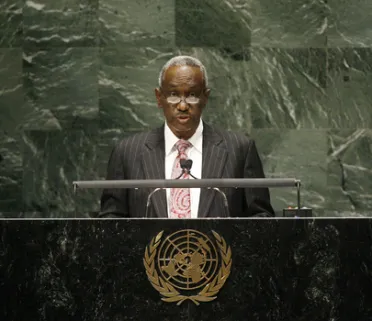Déclaration
Résumé
M. ALI OSMAN MOHAMED TAHA, Vice-Président du Soudan, a rappelé que l’Accord de paix global signé en 2005 vient de faire l’objet d’une réunion de haut niveau à l’ONU. Il a dit souhaiter que « nos frères du Sud » puissent s’exprimer en toute liberté et que l’unité du pays soit le choix de tous les habitants. Avant d’en venir à la situation au Darfour, il a engagé au respect des résultats du référendum. Au Darfour, a-t-il dit, le Gouvernement a élaboré une nouvelle stratégie.
Cette stratégie, a-t-il expliqué, se fonde sur cinq piliers, à savoir la sécurité, la consolidation du développement, la réinstallation des personnes déplacées internes, la réconciliation nationale et la poursuite des négociations politiques. La stratégie se base également sur le partenariat avec divers organismes internationaux et la participation citoyenne de la population. Dans ce contexte, le Gouvernement entend améliorer ses relations avec le Tchad, a-t-il ajouté.
Le Vice-Président n’a pas manqué de dénoncer « la politisation et la sélectivité » qui prédominent à la Cour pénale internationale (CPI), « instrument qui brise la volonté des peuples et qui cherche à leur imposer ses choix ». Il a demandé au Conseil de sécurité de « retirer » le dossier du Darfour à la CPI et de le renvoyer au système judiciaire soudanais, « conformément » au droit international et au droit soudanais. Après la signature de l’Accord de paix global, nous aurions espéré, a dit le Vice-Président, que la communauté internationale nous tende la main, en annulant, par exemple, notre dette.
Déclaration complète
Lire la déclaration complète, en PDF.
Photo

Sessions antérieures
Accéder aux déclarations faites lors des débats généraux des années passées.
